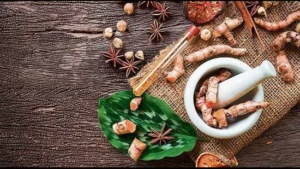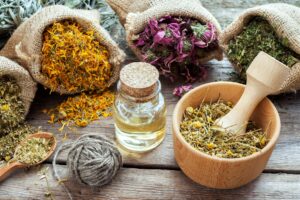
At one time or another, most of us have utilized herbal medicines – whether that be chamomile tea for anxiety relief or eucalyptus oil to soothe muscle aches – as part of our healing regimens. When taken correctly and at appropriate dosage levels, herbal medicine can provide an alternative or replacement solution for pharmaceutical medication.
Natural solutions provide a holistic approach to health and wellness that eliminate the use of synthetic chemicals, providing relief for digestive discomfort, immunity issues and stress management.
1. Chamomile Tea
Chamomile is one of the most frequently prescribed herbal medicines and it’s easy to see why. Chamomile flowers belong to the Asteraceae family and contain essential oils and plant nutrients with soothing properties, making chamomile an effective remedy against anxiety, soothing irritated skin conditions, treating eye infections, stomach disorders as well as aiding children suffering from colic or croup. Typically dried and consumed as tea to reduce anxiety levels or soothe irritation in order to provide soothing benefits ranging from anxiety reduction, soothing irritation to treating eye infections or treating colic and croup in children suffering from colic or croup.
Make Chamomile Tea By Steeping Dry Chamomile Flowers in Boiling Water You can easily make Chamomile tea at home by steeping dry chamomile flowers into boiling water, using tea bags of various brands and blends available from many retailers or using internal capsules or tinctures from companies offering internal use solutions for Chamomile.
Though chamomile may be safe when taken in small doses, certain people should avoid it for reasons related to health. Chamomile can trigger allergic reactions in some people including itchy eyes and runny nose; moreover, it may interact with medications that prevent blood clots as well as sedatives; please speak with your healthcare provider prior to using chamomile.
2. Turmeric
Turmeric is an attractive golden spice used to add vibrant hues and delicious flavor. Additionally, this herb is known for its anti-inflammatory properties that may reduce arthritis pain while being an excellent digestive aid that may ease indigestion or gas.
Curcumin, the active ingredient found in turmeric, has been demonstrated to provide numerous health benefits. It’s an antioxidant, anti-inflammatory and antimicrobial agent; additionally it boasts high fiber content as well as vitamins and minerals such as C, K, IRMZZZ.
Turmeric is a tropical crop and known by several names across languages (Table 13.1). In North India it may be called haridra; while Chinese medicine uses the term yujin to promote energy flow throughout the body and enhance well-being. Furthermore, turmeric plays an integral role in rituals and ceremonies throughout Asia.
3. Peppermint
Peppermint oil’s fresh, sharp scent alters calcium channels in cold receptors to produce a cooling sensation and help relieve headaches1. Furthermore, serotonin and substance P-induced smooth muscle contractions are prevented, adding further analgesic properties2.
Mint (Mentha piperita) can be an effective herbal remedy, both the leaves and essential oil being beneficial to use as herbal remedies. Mint oil can be taken internally as a dietary supplement or applied topically for treatment of digestive discomfort; tea made from this herb is often used to ease nausea. Peppermint boasts anti-inflammatory and antioxidant properties which protect the digestive tract lining; this makes it beneficial in relieving cramps caused by IBS as well as relieving mild gallbladder disease symptoms.
Peppermint oil may help the body digest fats and other foods more easily by stimulating bile to aid in digestion, and may stimulate certain parts of the brain that control emotions and memory, aiding concentration. Furthermore, research suggests its scent improves mental alertness as evidenced by one small study2, and inhaling peppermint oil through a diffuser or vaporizer could further increase attention while simultaneously decreasing fatigue levels.
4. Elderberry
Elderberries (Sambucus nigra) are an integral component of many products such as gummie bears, syrup, wine and supplements. A popular claim about elderberry is its ability to help prevent and relieve cold and flu symptoms; studies have confirmed this claim by showing it may help decrease duration and severity.
Elder tree flowers and berries act as diaphoretics to ease fevers while also supporting skin health. Herbalists recommend elderberry for treating many conditions including arthritis, sinusitis, laryngitis, hay fever, dermatitis, psoriasis and rheumatic pain.
Recent research published in Nutrients found that people who took elderberry extract prior to air travel experienced two days shorter duration of colds and decreased symptoms, likely because elderberries contain compounds which bind with influenza viruses. Be mindful that herbal supplements do not fall under the same stringent testing, manufacturing and labeling requirements as traditional pharmaceutical drugs – so if you are contemplating taking one it would be advisable to speak to your health care provider first if any preexisting conditions such as autoimmune diseases, heart disease or organ transplants exist prior to taking any herbal supplements.
5. Thyme
Thyme (Thymus vulgaris) is an aromatic herb with soothing, anti-inflammatory, antibacterial, antiseptic and expectorant properties. Additionally, thyme can support healthy immunity systems and is helpful for treating respiratory conditions, bloating, high blood pressure and skin issues as well.
Studies reveal that thyme contains phytochemicals with antimicrobial activity, including phenolic acids like rosmarinic acid and carvacrol as well as terpenoids, flavonoids and tannins – acting like natural food preservatives to kill germs that cause colds, coughs, sore throats or stomach upset. Its antimicrobial properties make thyme an invaluable natural food preservative and aid in keeping germs at bay that cause illness like colds, coughs, sore throats or stomach upset.
Add fresh or dried leaves of thyme to soups and other recipes as a seasoning, tea, mouthwash or as an ingredient in antifungal creams to add the perfect finishing touch. It can also be used as an herbal medicine treatment; simply steep 1 teaspoon of dried or fresh leaves per cup of water until brew time has ended and enjoy up to three cups per day for colds/sore throats/mouthwash and antifungal cream use; always consult your physician first when taking supplements or herbal treatments as thyme may cause allergic reactions when used alone or when taken as part of an antifungal cream treatment plan; just remember it could cause adverse reactions in some people sensitive to members of Lamiaceae family plants such as oregano/sage etc – always seek medical advice before trying anything new that could affect you negatively!




